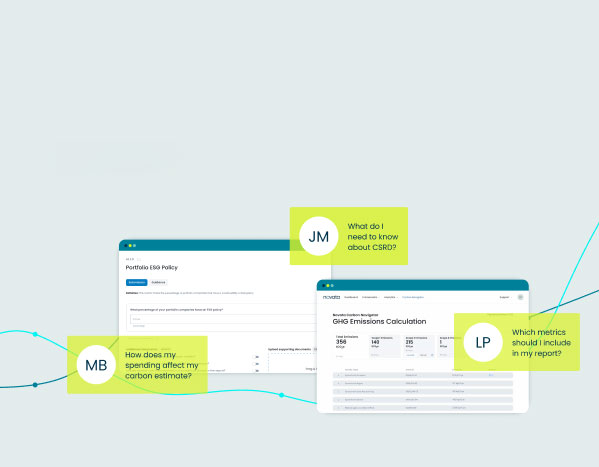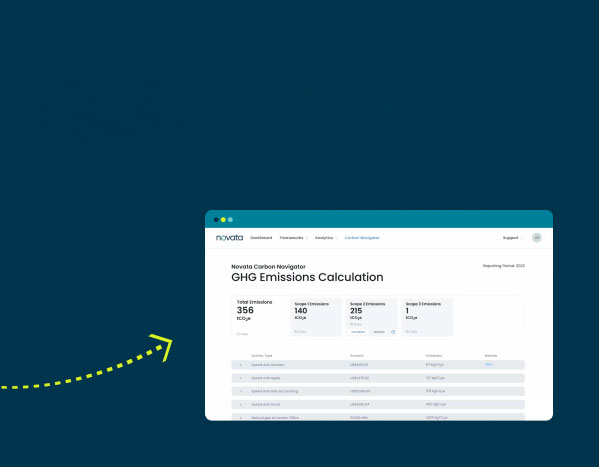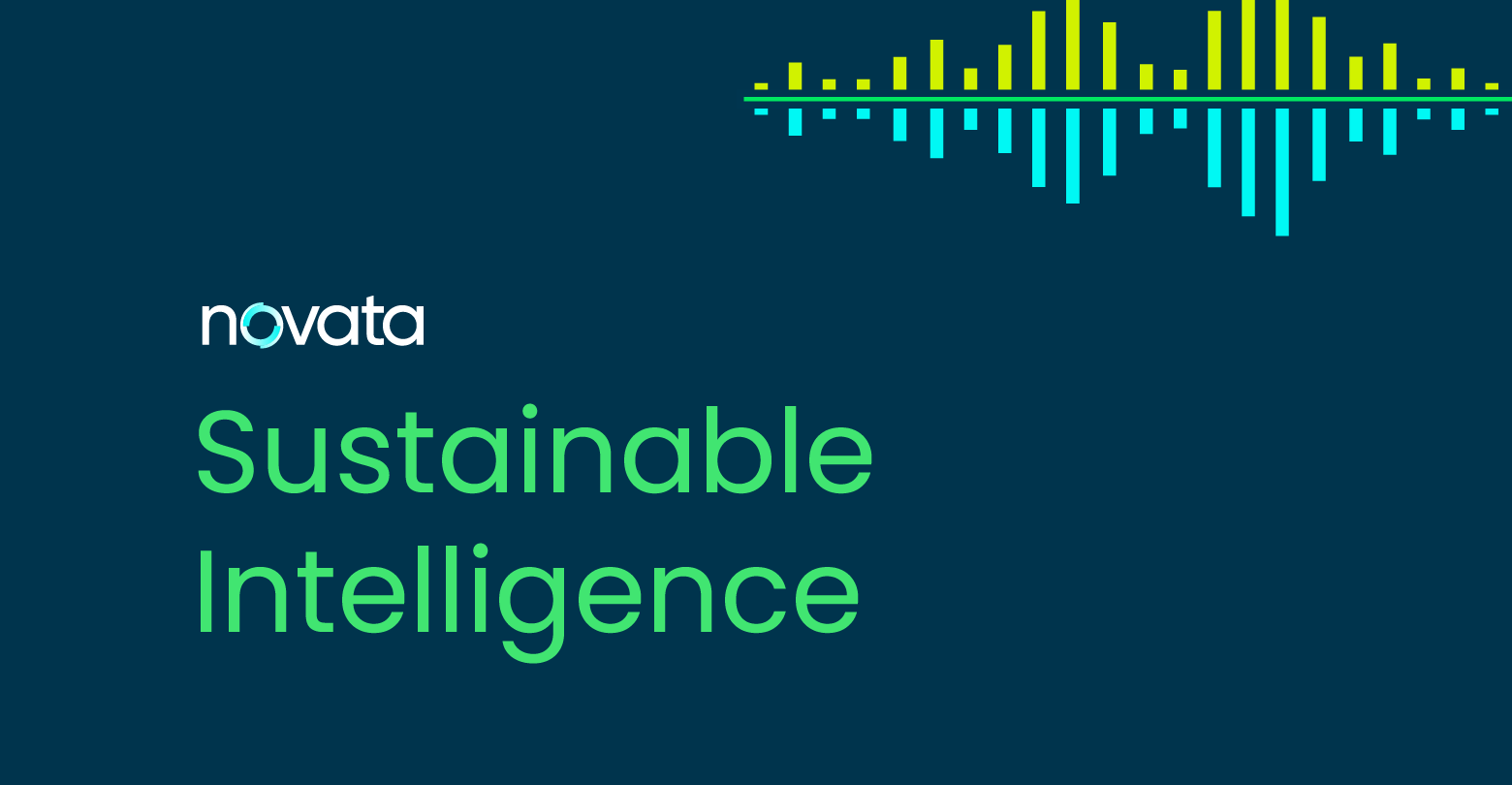In this episode, Beth Meyer, Chief Legal Officer at Novata, explores the critical importance of collecting ESG data and how it empowers investors in navigating regulatory landscapes. Listen as she dives into the benefits of ESG data collection and highlights its role in mitigating risks and uncovering untapped opportunities across portfolios.
About Sustainable Intelligence
Sustainable Intelligence is an interview series from Novata that explores ESG and sustainability in the private markets. From carbon accounting to using data to create value, the series dives into the challenges and opportunities facing private market investors and company leaders as their integrate ESG across the business and respond to regulatory requirements. Each episode centers authentic dialogue, highlighting experts at the forefront of advancing ESG data collection and driving meaningful progress in the sustainability landscape. Listen to more episodes.
Conversation with Beth Meyer (Transcript)
Ella Williamson: Welcome to sustainable intelligence, where we discuss all things, ESG and sustainability for the private markets, brought to you by Novata. I’m Ella Williamson and I’m thrilled to be your host. Today, we’re thrilled to have Beth Meyer, Chief Legal Officer at Novata, joining us. In addition to leading Novata’s legal team, she spearheads the company’s metrics and regulations team. Prior to joining Novata, Beth was Associate General Counsel and Head of ESG at TechStars, a global venture fund and accelerator. Together, we’re diving deep into the importance of collecting ESG data and arming you with the knowledge to confidently navigate this regulatory landscape.
Right. So let’s jump in. What is the real benefit for an investor to collect ESG data across their portfolio?
Beth Meyer: I love this question. I don’t think enough people are paying attention to this question! I’m actually going to deconstruct ESG data and just say, any material, not traditionally viewed as financial data across your portfolio. I think the number one benefit is giving you clarity into the risks and opportunities across your portfolio. I’ll start with risks, then I’m going to go into opportunities because I actually feel like opportunities is the most important point here and it doesn’t get as much attention. ESG data, is data about how your business operates and operates in the world that operates itself?
Does it have proper governance? Is it a data company? And they actually don’t have. Cybersecurity in place. Is it an international company and they actually don’t have any sort of anti-corruption training or policies, knowing this data and understanding what they have in place, what their impact is on the environment, around them, where they’re located and the climate risks associated with their location can give you the ability to mitigate those risks, to get in front of them. To support the company so that you can help prevent issues that would arise relating to gaps that you’ve identified by collecting this ESG data. I think that’s one of the best and biggest, and I take that really seriously from a legal perspective because there’s so many things that I think get glossed over and often haven’t been collected. Regarding either diversity or internal controls, or environmental exposure, or how they’re tracking all of that. Without that information, you can’t manage it. And if you can’t manage it, you can’t improve it.
On the opportunity front. We’re entering into a transition economy. There’s not a part of the world that is not affected by everything happening in the environment. Everything happening in society and affected by the way companies govern themselves or are governed by the regulations that apply to them. By getting that information, comparing it against benchmarks, seeing where those companies should be relative to others or that they’re outpacing them is an incredible opportunity. For an investor to say, oh, we’re going to lean into this. We didn’t realize it until you collected this data but actually we have an incredibly low carbon footprint at this company so we’re going to start to advertise that. We’re going to make these commitments, we’re going to lean into this opportunity. We have an incredibly diverse workforce, we didn’t realize that until we collected this data as a result, we’re going to get more feedback. We’re gonna expand to other markets, but markets based on, the diversity of this team. There’s so much that can be gained from collecting this data. And what’s really interesting is it’s hard to point to the downside.
So the question you ask is what is the benefit for an investor to collect ESG data across their portfolio? There’s a host of benefits. It’s hard to pinpoint what the downside would be.
Ella: I think it’s such a great point and people always talk about risks, and opportunities. And in this case, there really is no downside in that. But I think it is important to think about what ESG data really is. I mean, is it all actually about risk mitigation?
Beth: I think risk mitigation has gained a lot of traction because over recent years there’s been political debate over ESG, specifically the acronym. What that means and where it really is boiled down to. Something that has cut across party lines has been – it’s a massive tool for risk mitigation. So it does allow you to get a grip on things that are lacking. And companies in your portfolio where they need more support, where they are falling short compared to others. It may manage what you wouldn’t have otherwise readily seen that doesn’t fall within the scope of the sort of information rights that you typically get as an investor. That’s where the risk mitigation is really powerful.
Is it all about risk mitigation? Not at all. It’s saying, let me dig in and have greater transparency into how this company operates, how exposed, and the impact it’s having on all of its stakeholders and how can we best capitalize on that? How can we best help them grow? So, I would actually argue it is a bit more about opportunity than it is about risk mitigation.
Ella: And it sounds like it’s about finding those hidden gems that can really drive both financial and social returns. I’d love to get your thoughts on what investors should do with all the data that they actually end up collecting.
Beth: They can do so much with it.
I think one – share it. You’re probably going to have to, under a lot of the regulations that have recently been passed. But, share the transparency into how your companies are operating, what they’re doing. Share it with your own investors, your limited partners.
If you’re a fund, give that visibility, get feedback. How can you better offer portfolio services? How can you better support them? I think that’s one key area. The other is action planning. So that is a question we get, I’d say I get a lot from our clients in the venture capital space. Coming from that background myself, that was something I wondered, when you go through the data collection process, which can be an arduous journey. Although there are tools that can help you streamline it. And you say, now I have all this information: this is the diversity profile of this number of my portfolios, this is the money, this is how many are working in the energy sector, and this is how they handle that. What do I do with this? What you can do is you can help them improve. You can help them put better controls, then you can help them reduce their footprint and you can help them cut costs as a result, engage in more sustainable business practices, develop the infrastructure that allows them to be more resilient.
I think resilience is a really key aspect that people have found that do collect this data. It allows them to shore up and offer better support to the companies that need it, and also rely on those that might have a competitive advantage that you wouldn’t have realized if you didn’t collect this data and help them develop and diversify your portfolio as a result.
Ella: I love that and I think it’s all about that word resilience that you kept coming back to and how it’s actually a long-term journey that every company needs to go on.
Well, thank you so much for today’s episode, Beth. It’s been fantastic to hear all of your thoughts
Until next time. Let’s keep building sustainable intelligence together. Find out more at novata.com.






